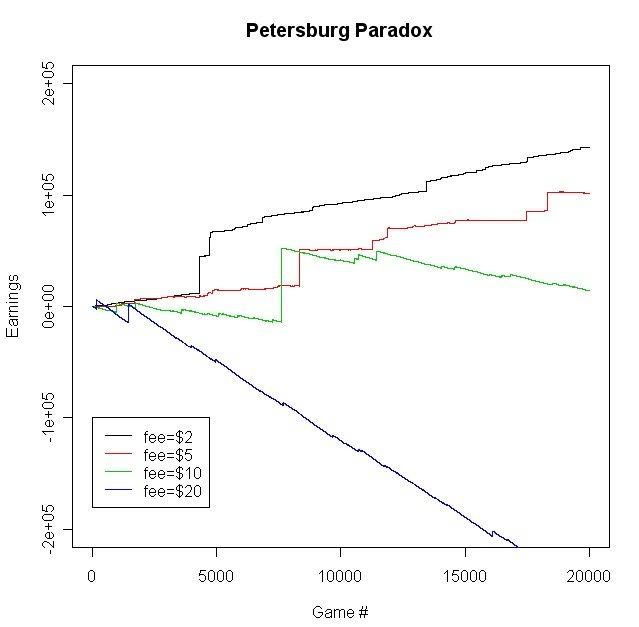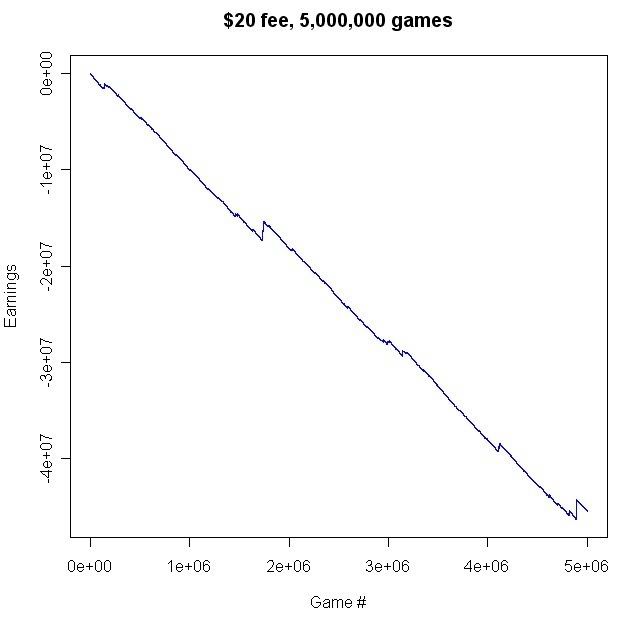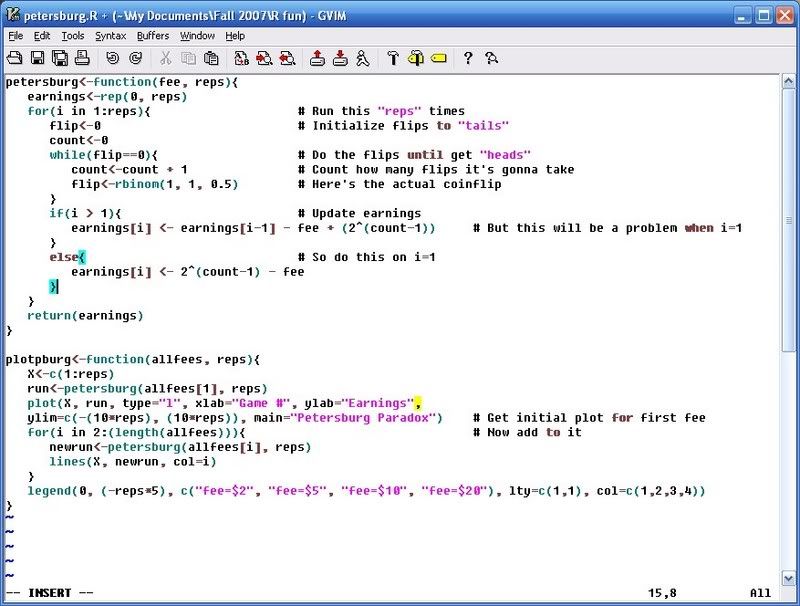
 |
|
#11
|
|||
|
|||
|
If you could have multiple iterations but it was relatively expensive, I assume this would some truly sick variance.
|
|
#12
|
|||
|
|||
|
You can play this +EV game for $20 at this website. Repeatedly press the "play a single game" key and watch your positive EV losses mount!
http://www.mathematik.com/Petersburg/Petersburg.html |
|
#13
|
|||
|
|||
|
ok, I got curious so I ran my own simulations on this and got some plots. I didn't like the plot shown on the wiki because that's just a running average of your winnings over however many games you've played, not a running total win/loss. And it doesn't even take into account any fee that might be paid to play such a game anyways.
So here's some results, under 20,000 reps with various fees. This shows a running total of your earnings while playing this game repeatedly.  soooo... ok you can pay up to 10 bucks a game and probably be pretty happy with the outcome over time, but... it really doesn't look good when you're playing for 20 bucks a game. But, this is ONLY 20,000 games! (hah) Let's see what happens when I jack it up!!  err... still doesn't look so good. I will note, though, that while playing around with it, under some trials of 20,000 reps the $20 fee line did wind up slightly above $0 every now and then. I'll leave you to draw your own conclusions. Also here's my R code for those who are proficient in it and would like to see what I did, maybe let me know if anything looks fishy. I know it's a bit clunky too; I need to use less loops. Also note that the OP says the pot starts at $2 whereas the wiki version starts the pot at $1; I didn't notice this until now and just followed the wiki, so I guess things will differ by a factor of 2 somewhere, but the idea is obviously the same. 
|
|
#14
|
|||
|
|||
|
[ QUOTE ]
I didn't like the plot shown on the wiki because that's just a running average of your winnings over however many games you've played, not a running total win/loss. And it doesn't even take into account any fee that might be paid to play such a game anyways. [/ QUOTE ] To factor out the effect of the fee, subtract this from the average win. [ QUOTE ] I'll leave you to draw your own conclusions. [/ QUOTE ] Your graph is misleading. It's not hard to check that the median, and any (nondegenerate) percentile of the average win will grow as the logarithm of the number of trials. |
|
#15
|
|||
|
|||
|
[ QUOTE ]
[ QUOTE ] I didn't like the plot shown on the wiki because that's just a running average of your winnings over however many games you've played, not a running total win/loss. And it doesn't even take into account any fee that might be paid to play such a game anyways. [/ QUOTE ] To factor out the effect of the fee, subtract this from the average win. [/ QUOTE ] While similar, and almost effectively the same thing, this still doesn't answer precisely the question that I was interested in. This is still an average win over how many games had been played up to that point. I wanted to know my net win/loss at each point. Yeah it's not really that different, but when I leave a casino, I tend to think in terms of $$ in my pocket. [ QUOTE ] [ QUOTE ] I'll leave you to draw your own conclusions. [/ QUOTE ] Your graph is misleading. It's not hard to check that the median, and any (nondegenerate) percentile of the average win will grow as the logarithm of the number of trials. [/ QUOTE ] Is my code wrong? If not, then my graph is exactly what I've claimed it to be: one realization of what will happen over 5 million games. This is why I personally concluded nothing from it, other than that you might not be happy after playing this game 5 million times. I actually expected things to look a little better than that over that many samples, but was wrong. I didn't intend for the statement "I'll leave you to draw your own conclusions" to imply that one should conclude that a $20 fee will make you a long run loser, though I do see how it might look like that. |
|
#16
|
|||
|
|||
|
People keep mentioning this game's variance. Does this game even have a finite variance?
I would assume not. |
|
#17
|
|||
|
|||
|
Since the expected value is infinite, the variance has to be infinite.
|
|
#18
|
|||
|
|||
|
peterchi: Interesting graphs, thanks for posting them.
The problem with the $20 fee version: After 20,000 games, your winnings will probably be around $150,000 (barring an extremely unlikely run of good or bad luck). If you're playing for $2 you'll be up $110k, but for $20 you'll be down $250k. As your graph shows, the $2 and $5 games are profitable quickly, and the $10 game takes several thousand plays before you come out ahead. As you play for more money, it takes an exponentially longer amount of time before (with normal luck) you'll make a profit. To make a profit in the first 20,000 plays, you'll have to hit a string of 17 tails in a row. The odds of this are 1 in 131,072, so you've only got a 1 in 6.5 chance of being profitable by then. Hmm, now you're going to make me find out how long on average before a $20 game does become profitable. Seems to me like it should have happened in the simulation you ran... hard to say for sure though. |
|
#19
|
|||
|
|||
|
OK, I realized two things:
1) In my above post it should be 16 tails in a row (not 17), with 1 in 65k odds, so a 1 in 3.25 chance to have a profit 2) This is beyond my ability to calculate, so I quit. Here are some facts though: After 5 million games, you've paid $100 million to play. A string of 25 tails is worth $67 million. I assume you'll at least need that to happen once in order to make a profit. The odds of 25 tails in a row is over 1 in 33 million, so you're even LESS likely to have made a profit at this point. So it looks like there are now two possibilities here: 1) I made another mistake 2) $20 is so far above the usual amount won, that the only way you can ever profit is to play an infinite number of games. Because no matter how much money you've lost, the odds of hitting some virtually impossible jackpot will never reach 0. |
|
#20
|
|||
|
|||
|
[ QUOTE ]
The problem with the $20 fee version: After 20,000 games, your winnings will probably be around $150,000 (barring an extremely unlikely run of good or bad luck). If you're playing for $2 you'll be up $110k, but for $20 you'll be down $250k. [/ QUOTE ] I don't understand the basis of these statments. Are you using some sort of confidence interval? Without a mean it really makes no sense to me. And since these are all independent events, I don't see any way you can expect to go down at first then eventually up. I understand how the lower bound of a confidence interval could begin negtive for some confidence level then become positive as the number of trials increases (given mean > 0), but the notion of an upper bound being below zero for a number of trials then the lower bound being above zero for a number of trails seems impossible, given a starting value of 0 and independent trials. I'll wait for someone better at probability than I to weigh in. |
 |
|
|